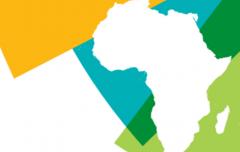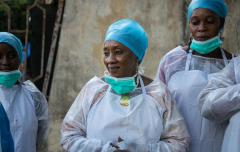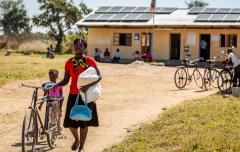Damilola Ogunbiyi: How Nigeria is using the pandemic to build a sustainable energy future
This blog was originally published as part of the World Economic Forum's ‘Seizing the moment’ series.
- The pandemic offers an opportunity to accelerate access to clean energy across Africa - and Nigeria is taking advantage.
- The country's plans include building 5 million new solar home installations and mini-grids.
- This strategy could also promote greater economic resilience and hundreds of thousand of new jobs across the country.
COVID-19 has changed the world as we know it. As business as usual has been thrown out the window, new opportunities are emerging that could pave the way to a more prosperous future for all – and this is particularly true for energy access. As countries continue to rebuild from the pandemic, clean energy investment can support them to ‘Recover Better’ and use this unique moment to reset their economies and close gaps in energy access.
The pandemic has highlighted the deep divide in Africa on energy access progress. The latest data on Sustainable Development Goal 7 (SDG7) – which aims to secure access to affordable, reliable, sustainable and modern energy for all by 2030 – shows that progress in Africa is not yet on track to meet global targets. An estimated 565 million people still lack access to electricity, while a further 900 million lack clean cooking solutions. The pandemic risks setting progress even further behind.
In the new Recover Better with Sustainable Energy Guide from Sustainable Energy for All (SEforALL), we have identified key enablers that countries across Africa should adopt as they continue their economic recovery. From increased GDP, job creation, affordable energy provision and improved agriculture, gender and health outcomes – the benefits have never been clearer from investing in clean, sustainable energy.
One country that has quickly recognized this opportunity is Nigeria.
A unique opportunity
Nigeria has a population of more than 196 million, with an estimated 85 million people lacking access to electricity and 176 million people without access to clean cooking fuels or technologies. The COVID-19 recovery therefore offers a particularly unique moment for the country to reset and accelerate progress on delivering sustainable energy for all.
Nigeria’s recently released economic recovery plan has energy access embedded within it, and many of the commitments put forward in the plan would have been unimaginable just six months ago. For example, as an oil and gas-rich nation, Nigeria’s decision to eliminate fossil fuel subsidies is a major step forward. With the price of oil the lowest it has been for 18 years, now is the time for countries to float liquid fuel prices, which, if anything, will result in a short-term benefit for consumers. When the price rises again, governments must refrain from re-introducing the subsidy, especially when we consider that with just a 1.2% global increase in green investment and a mere 0.4% decrease in fossil fuel investments, valuable jobs will be created and significant progress made on the Paris Agreement on climate change.
A key provision in Nigeria’s plan is a commitment from the federal government to deliver and maintain 5 million new solar connections under a ‘solar power strategy’. This strategy is expected to support 250,000 new jobs and impact up to 25 million beneficiaries through the installation of 5 million solar home systems and mini-grids. The plan also supports the upstream value chain by promoting the large-scale assembly of solar components in Nigeria.





